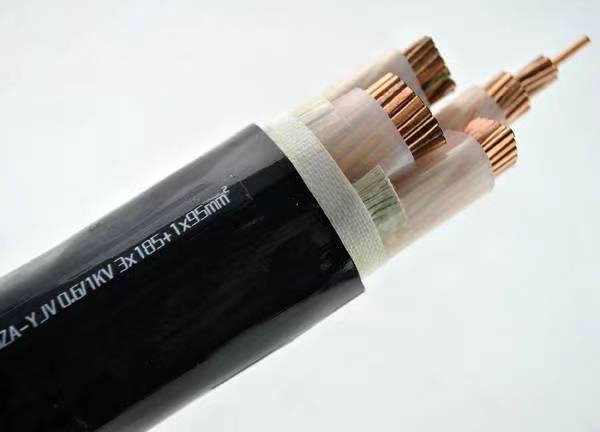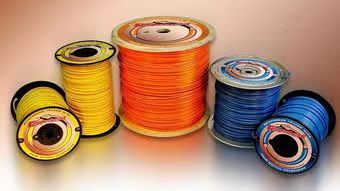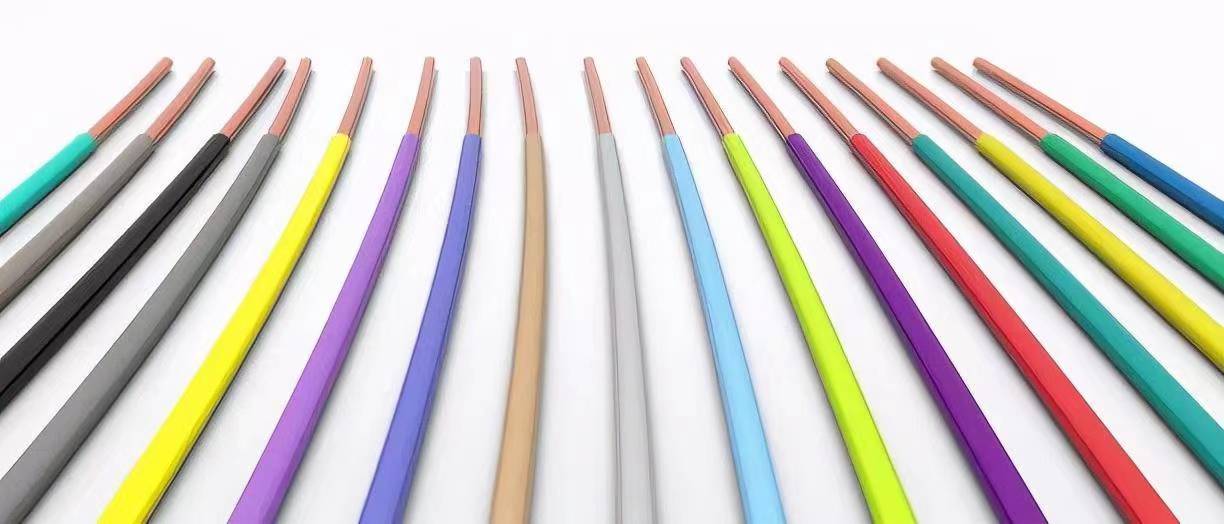Environmental protection cable refers to the cable does not contain lead, cadmium, hexavalent chromium, mercury and other heavy metals, does not contain brominated flame retardant, by SGS recognized testing institutions on environmental performance test, in line with the European Environmental Directive (RoSH) and higher than its indicators requirements.

Do not produce harmful halogen gas, do not produce corrosive gas, burn less fever, do not pollute the soil wire and cable.
The characteristics of environmental protection cable
1. High flame retardant grade:
The environmental protection cable thoroughly ensures its engineering construction regulations with high fire safety requirements. In case of fire accident, the cable is not easy to burn, and can prevent the spread of fire after burning and the expansion of disaster.
2. Phthalates:
Choose low carbon environmental protection cable sheath, sheath and special production of raw materials, oxygen insulation layer not only has excellent electrical properties, physical properties of physics, and ensure that the goods have no halogen bulbs, that, when burned, solved the “secondary pollution”, to prevent the traditional PVC wire burns can be caused by carcinogens “dioxins” chemicals.
3. Low endotoxin:
The insulation layer and sheath do not contain lead, cadmium and other heavy metals that are harmful to the body, which are not easy to cause environmental pollution to the soil layer and water resources when the environmental protection cable is used and the waste is solved. And after rigorous toxicity tests, the mice were safe under the required test standards.
4. Do not cause corrosion vapor body:
The selection of new special shifting raw materials with zero pollution to the natural environment, the whole process of production, application and combustion is not easy to cause harmful gases such as HCL, the acid gas emission is very little, and the harm to the staff and machinery equipment, instruments and equipment is small, more environmental protection characteristics.
5. High transmittance:
The smoke caused by the burning cable is very thin, which is beneficial to the fire evacuation and fire fighting work of the staff. The transmittance of goods is more than 40%, far higher than the traditional flame retardant type cable transmittance is not 20% of the specification.
6. Waterproof and ultraviolet protection:
Special molecular structure of green materials to ensure ultra-low water absorption. Special ultraviolet absorbent makes the product have good anti – ultraviolet function. It ensures the safety and prolongs the service life of the products.
What are the types of environmental protection cables
1. Degradable insulated wires and cables, also known as green ecological materials, can be decomposed into small molecules under the action of microorganisms, which will not pose a threat to the environment.

2. Electric wires and cables with pollution-free insulating paint and organic solvent will occur chemical phenomena in the process of use, resulting in a large number of harmful gases, which poses a threat to human health. The application of pollution-free insulating paint can avoid the harmful gases produced by electric wires and cables.
3. Easy to recycle insulation material wire and cable have a certain service life, and the abandoned wire and cable insulation part is easy to pollute the environment, so in order to protect the environment, we should use more green pollution-free products.
Matters needing attention
Attention in the installation or removal of environmental protection wire and cable temporary electrical engineering must be completed by electricians, and the requirements of electrical technology to be high.
The installation site needs domestic professional environmental protection wire and cable construction personnel must be familiar with the safety technology specifications, comply with the safety technology operation process, but also check equipment and protection facilities, but also do a good job of electrical maintenance records.
Note that all workers involved in the installation of environment-friendly electric wires and cables need to be familiar with the performance and use of electrical safety tools. When power maintenance is required for live work, construction tools with reliable insulated handles need to be used.
When inspecting high-voltage cable lines, professional construction personnel must wear gloves with high-quality insulation layer to prevent the installation personnel from being exposed to electric shock and other threats.
When installing or inspecting electrical equipment without power supply, installation personnel of environment-friendly electric wires and cables should take the following safety measures when encountering installation problems.
1. In case of power failure, the construction personnel shall power off all the equipment to be checked, and open at least one obvious switch to disconnect the isolation point.
2. When powering off the power, stop the cable load first, and then pull the cable disconnector. Do not pull the disconnector with load during the operation.
3. Nearby workers should keep a safe distance from electrically charged objects when performing power failure operations. It is also necessary to check the disconnection position. If there is no three-phase load connected on the line that can constitute the discharge loop, it is necessary to discharge fully.
4. When common signal marks of device disconnection are found, they are represented as the signal of the latching device allowing the entry interval and the indicator of the connected voltmeter indicating no voltage, which can only be used as a reference and cannot be used as the basis for the equipment to be without power.
Installation of environmental protection wire and cable is not only to protect the environment from pollution, but also to ensure the safety of construction personnel and users.
Therefore, in order to ensure that the installation of electric wires and cables can be safe and reliable for personal and property safety escort, the relevant construction personnel need to be able to clear and remember the safety protection precautions of these environmental protection electric wires and cables.
The difference between environmental protection cable and ordinary cable
Environmental protection wire and cable is different from the general ordinary wire and cable, its not only in the material and technology is different, performance and quality standards are far from the ordinary wire and cable.
1. Flame retardant and fire resistance: the flame retardant and fire resistance of environmental protection wire and cable fully meets the national fire protection standards.
When electrical fire occurs, wire and cable are not easy to burn, and can ensure the normal operation of the circuit system for a certain time under the condition of continuous combustion, and can reduce the flame diffusion of wire and cable after burning.
2. The insulation material and sheath material used by environmental protection wire and cable are green environmental protection materials, which ensure and stable electrical performance and physical and mechanical function at the same time, ensure the performance of wire and cable, avoid the “secondary pollution” formed after waste wire and cable incinentation.
3. Low toxicity of wire and cable: environmental protection wire and cable because of the particularity of the raw materials used, the insulation and outer sheath of the wire and cable does not contain lead, cadmium and other heavy metals harmful to human body, in the process of daily use can ensure our own health.
4. Wire and cable will not decompose corrosion gas: environmental protection wire and cable is the selection of new special materials, in the process of use will not produce a variety of toxic gas due to high temperature and other reasons, the harm to equipment, instruments, more environmental protection characteristics of wire and cable.
The insulation of the ordinary decoration wire is basically produced by polyvinyl chloride (PVC) material, and the environmental protection wire is the use of cross-linked polyethylene as the insulation raw material, with higher heat resistance, security and stability performance is also higher. To sum up, the main points are as follows:

1. It is a high flame retardant, as we all know, the flame retardant performance of wire and cable is very important, fully ensure the safety and fire protection requirements of the cable, wire and cable is not easy to burn fire, and can prevent the expansion of the flame;
2. It Is no peculiar smell and corrosive odor, does not contain hydrochloric acid and other toxic gases, no pollution to the environment production of new environmental protection coating wire and cable materials, the use process and combustion will not produce or very little emission of acid gas, to ensure the safety of personnel and reduce equipment damage and other environmental characteristics;
3. It is a high transmittance, environmental protection wire and cable burning smoke is very thin, conducive to evacuation and fire fighting work. The light transmittance of the product is more than 40%, which is much higher than the standard of the traditional flame retardant cable whose light transmittance is lower than 20% or even higher;
4. It is halogen free, green insulation, special oxygen barrier material, not only has good electrical properties, mechanical properties, and ensure that the product does not contain halogen, to prevent the formation of traditional PVC wire combustion to produce carcinogenic dioxins in the process of combustion, to prevent secondary pollution;
5. Environmental protection wire and cable waterproof and UV protection performance, environmental protection wire and cable special molecular structure, to ensure the manufacture of ultra-low water absorption rate of green environmental protection materials. Special ultraviolet absorbent makes the product have good anti – ultraviolet performance.
Well, that’s all for today’s introduction.